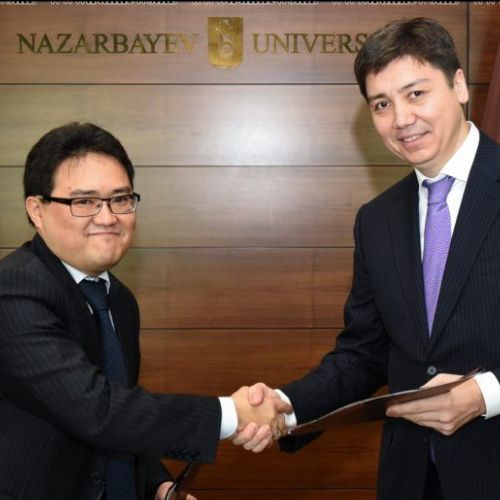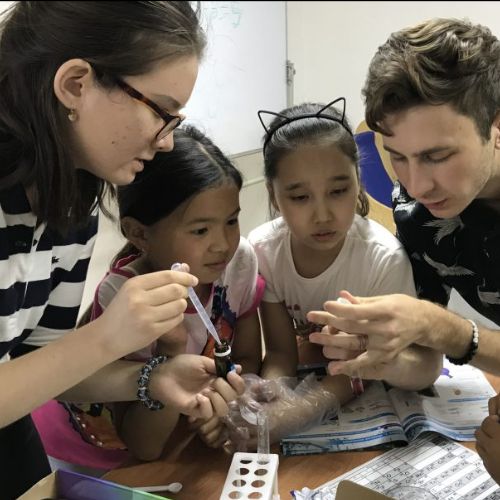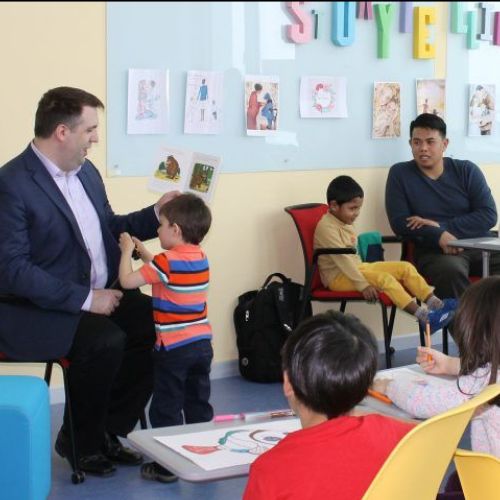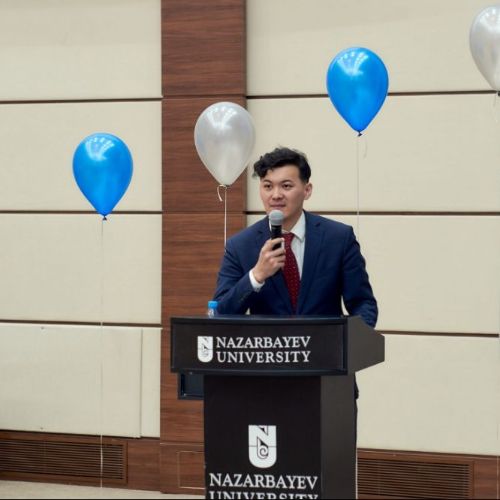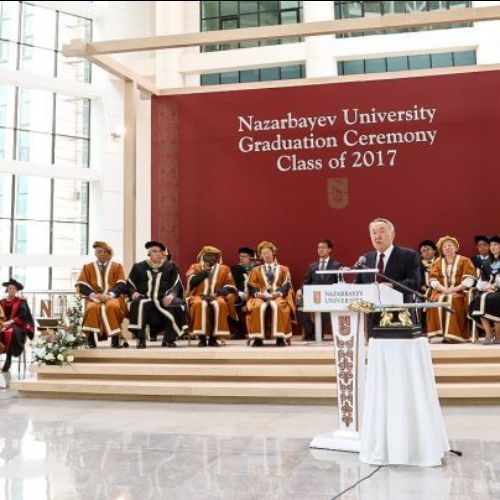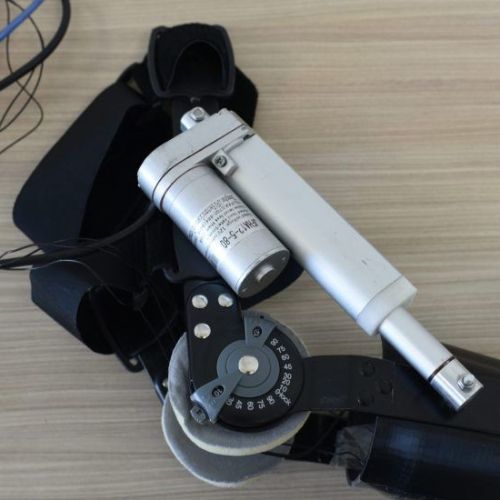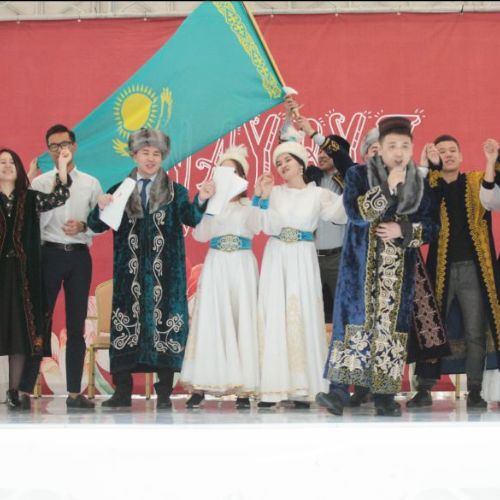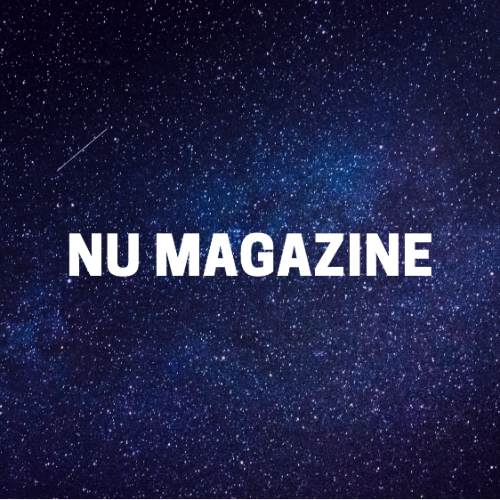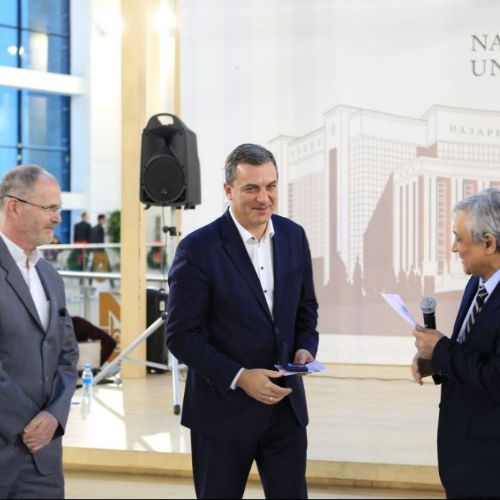
NU MAGAZINE
march 2019
CONTENTS
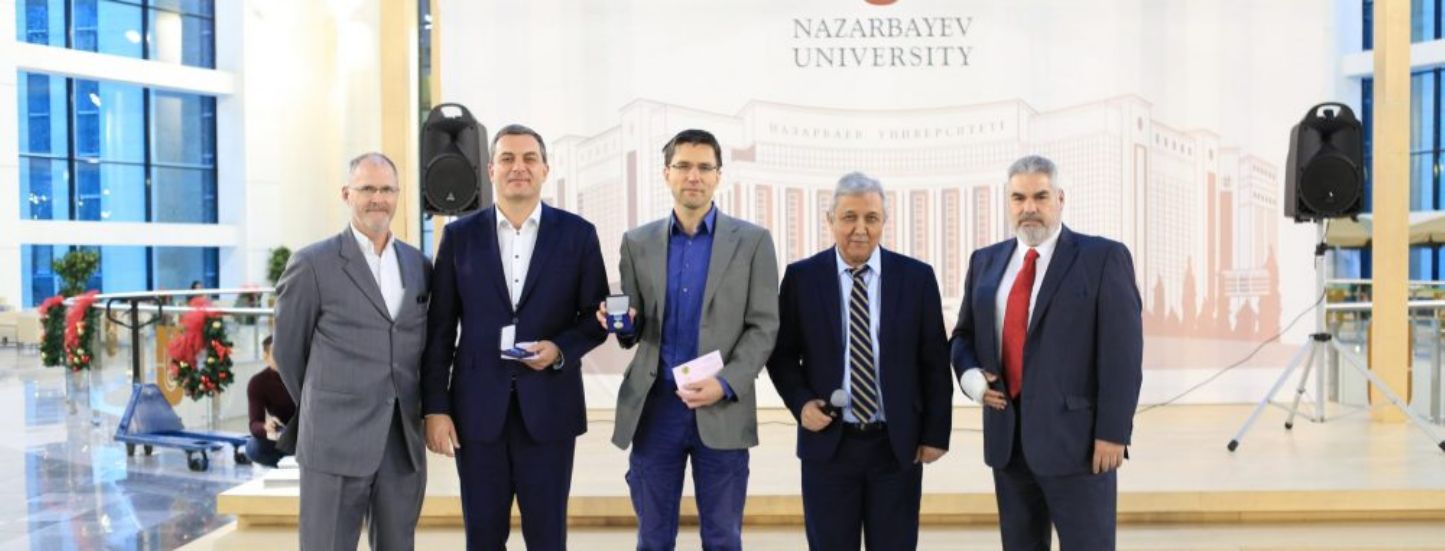
School of Science and Technology professors were awarded with insignia badges
School of Science and Technology professors Anton Desyatnikov and Alexander Tikhonov were given the award “Білім берудің құрметті қызметкері” (”Honourable figure in a field of education”) and this honor was marked with them receiving insignia badges. Dr. Bruce Grossan, a researcher affiliated with the NU- Berkeley project, and Leader of Observation Astrophysics and Optical Instrumentation in the Energetic Cosmos Laboratory, was also recognized during the award ceremony.
Professor of Physics Anton Desyatnikov was awarded for his research and publications in the field of materials and nanophotonics, successful educational activities and active participation in the work of the «Kazakh Physical Society».
Assistant Professor of Physics Alexander Tikhonov was awarded for his successful scientific research and construction of a new generation ion pulse accelerator (INURA) at NU in the framework of the target scientific program “NU-Berkeley”.
Dr. Bruce Grossan’s achievements include successful work on projects in astrophysics and cosmology related to cosmic gamma-ray bursts (GRB), far-infrared cosmic backgrounds, active galactic nuclei, and extragalactic extinctions. Currently, Dr. Grossan heads the project monitoring broadband optical tilt quick GRB.
The award ceremony was held at Nazarbayev University on February 7, 2019. The award badges were presented by Kanat Baigarin, the Advisor to the President of AEO “Nazarbayev University”.

Nazarbayev University signed a Memorandum with the national railway company
Nazarbayev University and JSC “NC “Kazakhstan Temir Zholy” signed a Memorandum of cooperation. Mr. Yerden Kussain, Nazarbayev University Vice President for Innovation and Mr. Serik Abdenov, Deputy Chairman of the Board for Corporate Affairs NC “Kazakhstan Temir Zholy” JSC signed the documenе which is aimed at the development of cooperation in the field of innovation and education.
Within the framework of cooperation, the organizations plan to carry out joint programs of innovative projects acceleration, and organize various events: trainings, seminars and internships. KTZ expects that cooperation with NU will increase the professionalism of young railway workers and help in the development of personnel policy in the company.

Equal access to educational opportunities
It’s the second year that the Inclusive Education Center – Education for All – has been working on NU campus. During this period, participants of the center have become well known across Astana and beyond. In addition to educational services, the center has also staged several plays and musicals as “Inclusive Theater”. Today we talk to Kamila Rolan, the founder who came up with the concept and ideology for the center after graduating from NU’s School of Humanities and Social Sciences and Graduate School of Education.
Kamila, could you please tell more about the history of the center? How has it started?
– Today, in Kazakhstan there are many children with special needs, only a portion of them – 70 000 – have actually been registered with disability status. Of these children, only 20% are enrolled at schools. Most of these children are home-schooled, which limits their ability to develop communication skills, make friends, and receive a competitive education.
In 2012, when I was a volunteer of the Red Crescent Society of Kazakhstan, I was involved in an educational project for children from low-income families and migrants. After four years of running this project I decided to apply to a Master’s program in the field of inclusive education. My MA program allowed me to not only realize the whole range of problems and barriers to implementing an inclusive educational model, but also obtain the skills necessary for overcoming these barriers. I thought that it would likely be easier in the non-governmental sector to implement these new models for Kazakhstan. Thus, I decided to found –Education For All (EFA) – as a public organization.
In the EFA, together with our team, we launched an inclusive education center. This is a place where children from ordinary schools and children with special needs can study together. They study academic subjects, sports, creative disciplines, and courses on professional orientation.
At the start of the project our groups were small, and to be frank even now we still have difficulties in attracting more students. We have children with a variety of backgrounds including those with Down syndrome, autism spectrum disorder, hyperactive children, gifted children, and children from low-income families. At times it can be hard for parents to understand the variety of children with different needs our center serves, and this can be stressful and frightening for some parents. We had a case when a family left after a parent saw a special child in the group with his kid, but for the most part there are more parents who appreciate the diversity and those who liked our approach. In general, we maintain close contact with the parents of our students.
What would be the main difficulties in your work?
– Probably our inexperience, especially in financial and legal issues. I also at times feel a lack of knowledge in some areas related to the business of public and socially-minded organizations. A lot of my time is spent solving these difficulties and engaged in fundraising. This means that I cannot fully focus on the primary mission which is direct work with children. Because we are a social business, there are limitations on what the center can earn. Additionally, I currently volunteer my time as unpaid at the center and still have to balance working elsewhere, which means I basically work 24/7.
Academic courses in our center are offered for a fee, but only for those who can afford to pay it. A portion of the income we earn is earmarked as a scholarship fund for children from vulnerable families, so that they can study at our center for free. We also provide free vocational guidance courses and our Inclusive Theater. Additionally, one of our NU alumni who now works in a private company, has helped get the company to support us by making some donations every month.
You are doing such a difficult, but incredibly noble cause! What does inspire you in your work?
– Our goal inspires me – striving for a society where all people can be equal members and get equal access to the opportunities. In addition to that, my team and our students inspire me very much. This is more than just a job or a hobby – this is the philosophy of my life, my values. There was a case where I and my team were speaking at a press conference, and the mother of one of our students, who had been sitting in the hall with us, started crying, listening to the answers that we had been giving to the journalists’ questions. She cried from the fact that she for once was understood and accepted, and we looked at her child as at a person with great potential, not a patient or an individual with learning difficulties and limitations. My heart sank at that time: that her family’s situation was misunderstood for so long and that she had to live in an unfair system. The right to study at school should be a constitutional right, and something that is taken for granted. And I want to further contribute to making educational access more inclusive for all.

A Reading Room for children opened at Nazarbayev University
Nazarbayev University Library recently opened a Children’s Reading Room. The room is a place for the families of students, faculty and staff to spend time together reading and working. The room has a variety of resources that are interesting to children, so that they may read alone while their parents work on other tasks, or everyone may read and learn together as a family. The room is open on weekdays from 8:30 am – 9:00 pm, and on weekends 11:00 am – 7:00 pm.
This is only the start of the library’s collection for children, but currently there are 553 pieces of literature in English, Kazakh, Russian, Chinese, Filipino and German languages. NU library’s teaching and research collections are very extensive with over 180 thousand printed and electronic resources, more than 200 thousand e-books by subscription, and more than 50 thousand e-journals in English, Russian and Kazakh languages.

Reasons to create an alumni association – questions and answers
We recently interviewed Arman Konkobay the Executive Director of “NU Alumni” a newly formed public association, about the organization’s formation, upcoming activities and plans. Arman graduated from Nazarbayev University’s School of Humanities and Social Sciences in 2015.
– After the first graduation in 2015, at the initiative of a small group of graduates the University created in March 2016 an Alumni Association to unite and create a strong professional network of NU alumni. However, the association was not registered or recognized as a public organization until November 8, 2018. Since 2015, the total number of graduates of Nazarbayev University has grown to over 2,600 people. Due to our university’s successful growth, we decided that it is time to register officially as a public association. So, in November 2018 the association was officially registered and acquired a new legal status. We want to focus on supporting alumni initiatives and engaging with the NU community. When deciding to publicly register the new association, we decided to look around the world for models of how other institutions had developed their Alumni organizations. We found examples of best practices from other countries and used them as reference points for NU Alumni.
What are your responsibilities as the head of the Association?
– First of all, our Association is intended for all University graduates who want to maintain a connection with their Alma mater. We plan to establish a scholarship fund through donations from NU graduates to support a variety of future university students. This scholarship fund should especially support those who are from the socially vulnerable segments of the population, or those students who are particularly distinguished members of the NU community, working on interesting social projects or important aspects of community life. We also plan to create an Institute for Mentoring, where alumni will mentor currently enrolled students. Although this mentoring is already practiced on a small scale, we want to formalize it and work in a more systematic way.
Also, we hope to hold an annual forum for alumni, where graduates will meet to discuss the various difficulties they face after graduating from the university. We have begun to implement the above ideas, and are planning much more.
We are still at the beginning of our journey, so the main task for us now is to establish the work of the organization, to convey to the University community the goal and mission of NU Alumni, and to begin growing a solid network of alumni.
What do you think is the benefit of creating such associations of graduates?
– I think that the creation of such an association is very important both for graduates and for the University itself. For graduates, the alumni association will help them to organize and use their professional and social ties for networking, and also with their future employment. For the University, the alumni association can partner to host events of interest to the community, and can help the University grow and develop by investing in its schools and programs. All of these activities, will increase the NU’s reputation at home and abroad, and this in turn will attract the best students from within Kazakhstan and from foreign countries.
What moments do you remember from the life of studying at the University?
– My whole period of study at the University was very rich and interesting, and it is difficult for me to single out something that is most memorable. I remember fondly my life in the student hostel- about the moments of contentment, and about the difficulties in studying and preparing for exams, about participating in amateur student performances, acoustic evenings, concerts and the work of numerous clubs. In short, my experience is probably typical for students who live on campus and study at university, I feel a diverse range of emotions, and have pleasant memories of this time.
How often do you meet with your fellow students?
– I meet with fellow students and graduates very often due to my work and role in this organization. I must say that many students after graduation do not want to lose touch with their Alma mater, many try to keep up to date on the University’s latest news and, if possible, to participate in University events. Today our alumni have their own website, social networks, and a telegram channel. In addition, we have begun to create a database of our graduates, and I periodically get in touch with graduates from different years.
What advice can you give to current students?
– I think our University is the best place to realize one’s potential. At least for me it was. And most importantly, here you are in your home country, receiving world-class education from professors from the best universities in the world. Therefore, I advise you to appreciate every moment spent in the University and make the most of all the opportunities offered by Nazarbayev University.

The Supreme Board of Trustees retains its composition
Our Founder, First President of Kazakhstan, Mr. Nursultan Nazarbayev remains in his position of the Chair of the Supreme Board of Trustees of Nazarbayev University, Nazarbayev Intellectual Schools and Nazarbayev Fund.
The competencies of the Supreme Board of Trustees include: approval of the long-term development strategy and the Charter of the University, Intellectual Schools and the Fund; approval of the procedure for asset management; composition of the Boards of Trustees of the University, Intellectual Schools and the Fund; and decision on reorganization or liquidation of the University, Intellectual Schools and the Fund.
Currently the Supreme Board of Trustees consists of nine people:
Nazarbayev Nursultan, the First President of the Republic of Kazakhstan, the First Chair of the Supreme Board of Trustees
Sagintayev Bakytzhan, Secretary of State of the Republic of Kazakhstan
Issekeshev Asset, Head of the Executive Office of the President of the Republic of Kazakhstan
Tazhin Marat, First Deputy Head of the Executive Office of the President of the Republic of Kazakhstan
Akishev Daniyar, Advisor to the President of the Republic of Kazakhstan
Mamin Askar, Prime Minister of the Republic of Kazakhstan
Shamshidinova Kulyash, Minister of Education and Science of the Republic of Kazakhstan
Massimov Karim, Chair of the National Security Committee of the Republic of Kazakhstan
Katsu Shigeo, President of the Autonomous Organization of Education “Nazarbayev University”

ReLive project received a grant from the World Bank
A research team from Nazarbayev University received a grant from the World Bank for their project related to the rehabilitation of stroke patients. This grant was within the framework of a joint project with the Ministry of Education and Science of the Republic of Kazakhstan “Stimulating Productive Innovations”.
-The grant money will be spent on software and for exoskeleton development to produce the ultimate product. For the next stage, our team will test, certify and register the product. After that, the product will be available for sale, – says Beibit Abdikenov, a Ph.D. student at Nazarbayev University School of Engineering.
The research team led by Professor of the School of Engineering at Nazarbayev University Prashant Jamwal and Beybit Abdikenov successfully demonstrated their innovative product at the UN’s special exhibition – “Assistive Technology in Accelerating Learning and Participation of Children with Disabilities” – on March 7-8 in Geneva (Switzerland).
– We demonstrated our invention to the representatives of more than 160 permanent delegations of the United Nations in Geneva, international and non-governmental institutions, scientific and research communities, organizations of persons with disabilities, as well as industry partners and inventors from many countries. Our team received appreciation from UN Director General, Mr. Michael Moeller, the High Commissioner for Human Rights, Ms. Michelle Bachelet, EU Commissioner on Digital Technology and Society, Ms. Mariya Gabriel, DDG Emergency Preparedness and response (WHO), and Ms. Afshan Khan, UNICEF Regional Director for Europe and Central Asia. We used this opportunity to talk about our university and Kazakhstan, and we believe that we achieved success in our mission, – says Professor Prashant Jamval.
Geneva_With Director-General of the United Nations Office at Geneva
With Director-General of the United Nations Office at Geneva and health minister of Kazakhstan
Geneva_With Director-General of the United Nations Office at Geneva
As previously reported, ReLive is an innovative solution for the rehabilitation of patients after a stroke. It includes equipment and software for reading and recognizing brain signals, a microcontroller and an exoskeleton of the upper limbs.
The system allows users to mentally manage the exoskeleton (artificial limbs), which can speed up the process of a patient’s recovery. Currently, the prototype has passed preliminary tests and is fully functioning.
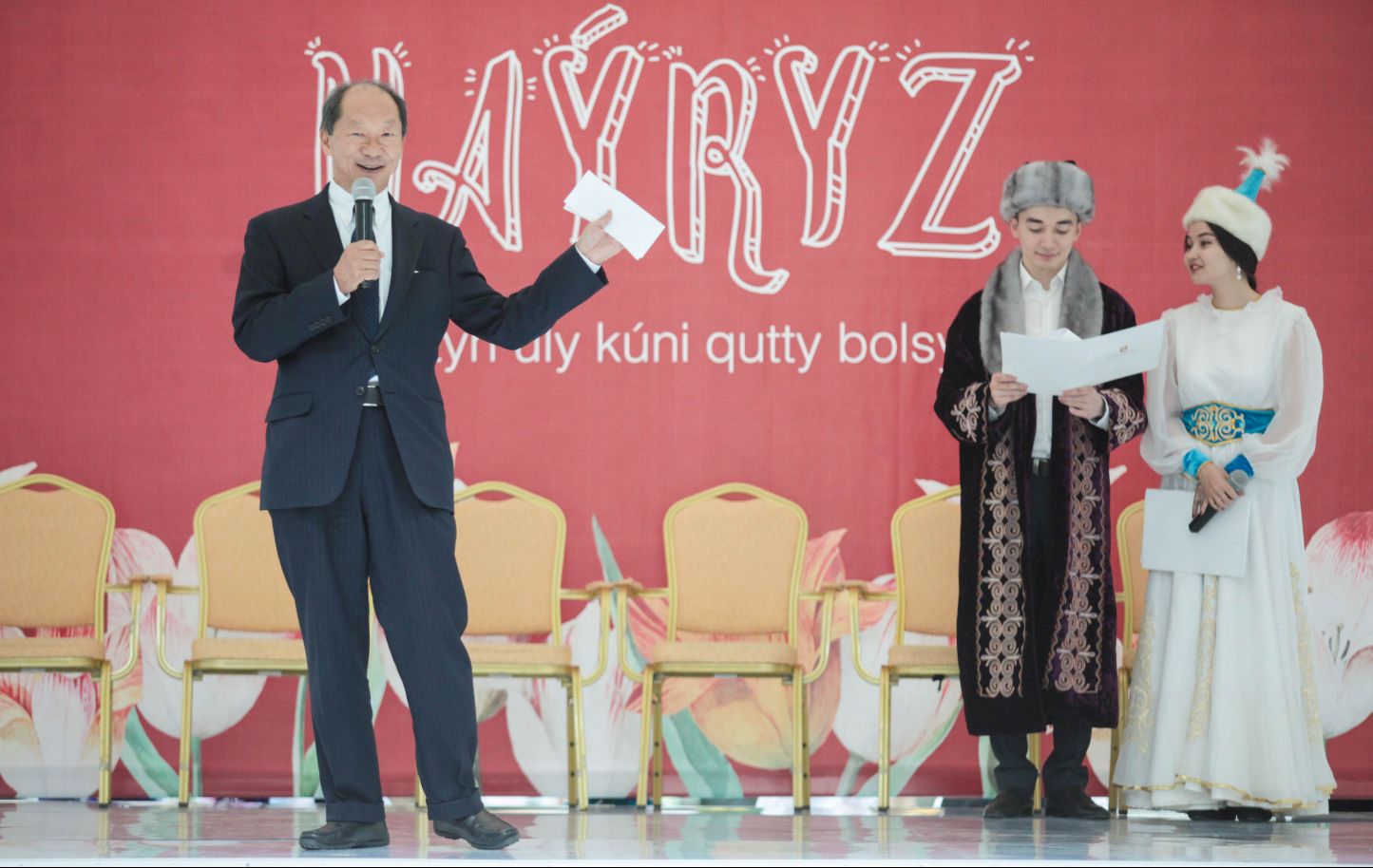
Nauryz Meyramy at Nazarbayev University
On March 29, Nazarbayev University held its annual celebration of Nauryz for guests, students, and university staff. Each year the university seeks to mark the holiday in new ways, and for the very first time ever the event featured a fair of Nazarbayev University’s international students, as well as a festival of cultures from different countries which occurred with the support of embassies and foreign missions in Kazakhstan.
Guests could visit a Kazakh ethno-aul, attend fascinating master classes of craftsmen, walk through the fair of international students, purchase national souvenirs, watch a festive concert and performances of national cultures of foreign countries, as well as take part in sports, quizzes, games and children’s entertainment. All participants were offered holiday treats.
In honor of the holiday, Nazarbayev University launched a photo exhibition “Hello, Aul”. This exhibit highlighted and celebrated important volunteer work done by NU graduates. This project is ongoing, but for three years already NU graduates have volunteered to teach English in rural communities in Kazakhstan.
“Starting from 2016, more than a thousand rural schoolchildren from Almaty and Zhambyl regions and southern Kazakhstan have completed elementary English courses,” – says Baknur Ziyabekov, Head of the public association “Alpha Academy” bilim academyasi ”(Almaty), an alumnus of Nazarbayev University Graduate School of Education.
The University was happy to celebrate the arrival of Spring, bringing together local and international staff, students, families, and visitors. Currently, Nazarbayev University hosts professors from 55 countries and students from 17 countries around the world.
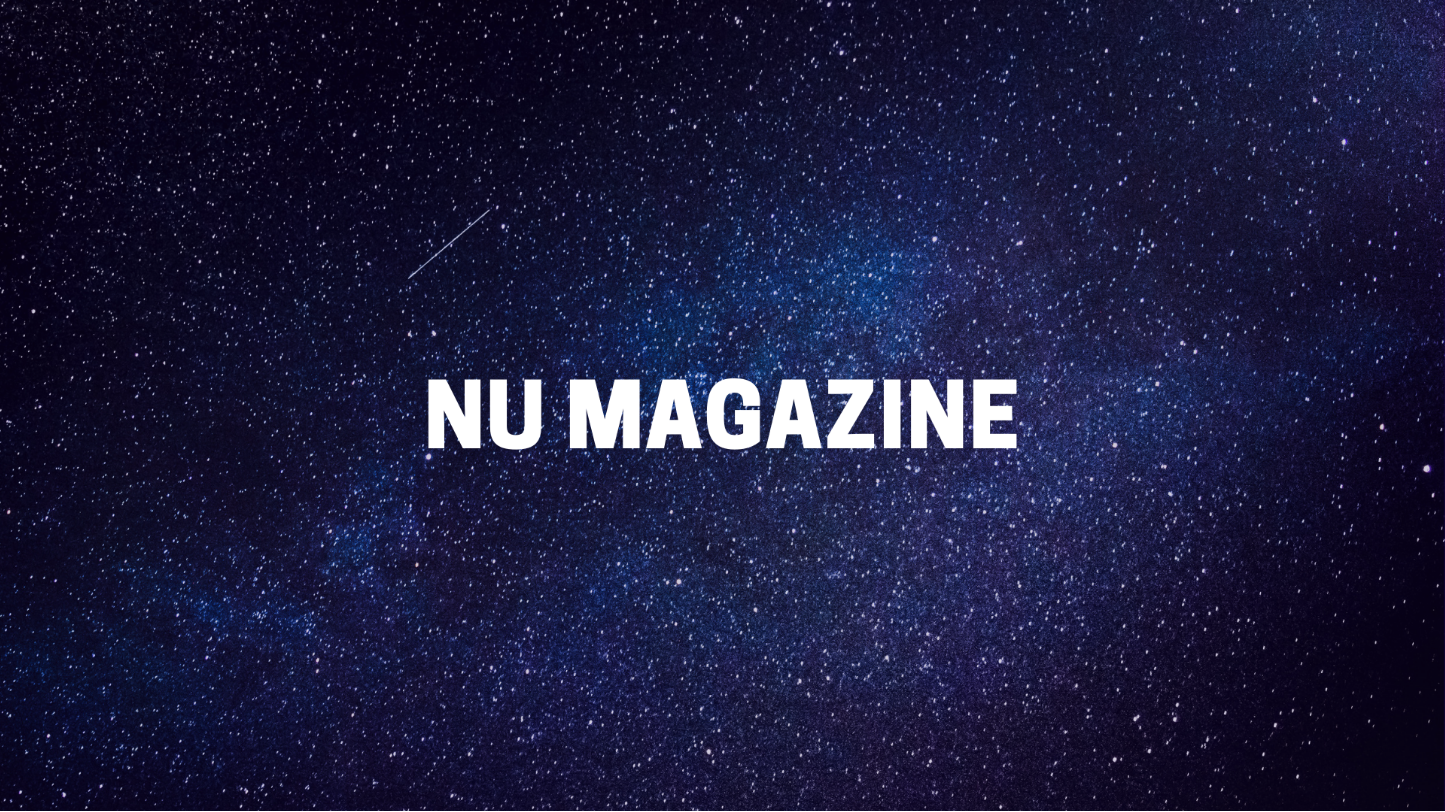
Good news!
The "NU Magazine" news digest is among 3 winners of the XI annual international competition "Press Service of the Year - 2018" in the nomination "The Best Electronic Corporate Media". The award ceremony will be held in Moscow on April 19.
CAC NEWSLETTER
Dear NU community,
We are happy to present the latest issue of the CAC News Digest.
Click here
© 2019 Press Office
